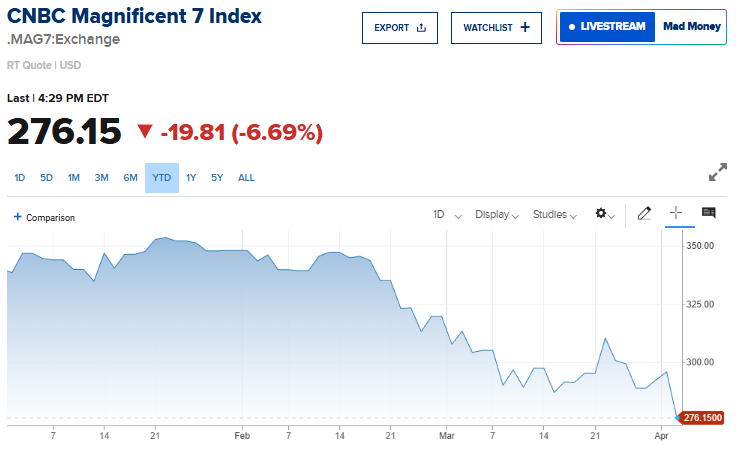Cody’s Top 5 AI stocks, the future of RFID, AMZN/GOOG earnings
Here’s part 2 of 2 of the transcript from of this week’s Interactive Live Stream/Q&A Chat. You can also watch a replay of the discussion on The IAm Cody Willard App, on YouTube here, and listen to a podcast version of it on Soundcloud or iTunes.
Subscriber: Cody, do you have any ideas for First Solar going into earnings? It’s getting smacked around a bit today.
Cody: Regarding First Solar going into earnings, be cool. Also, in my note this morning that I’m sending to Trading With Cody Subscribers I mentioned that I’m trying to be cool. As always. We should always be cool with our money. Don’t stress with your money. If you’re stressed, you’re over leveraged. You’re over invested. You’re doing something wrong. And yes, there will be stressful times. I’ve been stressed about money since I’ve had Amaris. I’ll be frank about it. Again, it changed my perspective on things. Not to mention, my monthly bills. I used to never care about money. But with a family comes legacy and wanting to do things in a different way. But after all, it’s just part of my life cycle. And again, it goes back to the question earlier about how much cash each of us should have on the books. It’s different for everyone. It’s different for me today than it used to be and I’m still figuring it out for myself as life changes. The cycle of life.
Subscriber: Cody, what are your top five Artificial Intelligence stocks?
Cody: I have four that are not gonna surprise anyone who’s been following me and/or AI, but the fifth will surprise you. First one, Amazon. “Alexa, play.” Let’s see what I was listening to before I was on the call. [Alexa responds suggesting a station Cody Might like, All Seventies from Amazon music. ‘Crying Eyes’ by the Eagles starts to play.] Oh no — no Eagles. “Alexa, next.” I liked the Eagles in High School, but not so much as an adult. Alexa plays ‘Say Good Bye to Hollywood,’ by Billy Joel. Haha, I should have listened to this song last week when I was leaving L.A. “Alexa stop.” That’s artificial intelligence by the way, the way that she goes “here’s a station that you might like”. Her doing that works off of her artificial intelligence brain back there in the cloud, which hass processed and stored what me and my colleague downstairs (who also uses my Alexa account) like to listen to. Luckily we have similar tastes, as he was a very influential person in helping me develop my musical tastes. I don’t mind that it uses his music selections to help base its choices for me such as a station I might like — in this case, “All Seventies Station.” So, $AMZN is number one. $AMZN is doing things with AI besides Ms. Alexa, of course.
Another one is Nvidia. Their chips are powering Alexa and so many other things that are in the cloud that is AI, deep knowledge, and all of that stuff. $NVDA is the leading platform and chip set to drive it.
Google Alphabet is one. They are trying to compete with the Amazon Alexa in home devices and such. There’s also competition here from Apple, but they’re not an AI company now nor will they be anytime soon.
Intel is another one. This is a little bit of a stretch as an AI play. They are definitely investing in AI and they will help drive AI though. Intel processors are still powering stuff in the cloud and their processors are going to be part of Artificial Intelligence. In some ways in years ahead, Intel processors can become help drive the brains that are going to make AI happen.
The one that will surprise you is Verizon. I bought Verizon recently because it’s a 5G play. They’ve invested billions in 5G spectrum and are building infrastructure for 5G right now. And see, AI will improve as the amount of data it can collect improves, and the amount of data you can collect improves as you have more broadband. You can put more internet of things and devices and sensors that are sending data back to the cloud in cars or in robots or in drones and everything else that this AI will be collecting data from and then improving on. So, Verizon is a stealth AI play. It will provide the riverbed upon which the AI water will flow. I should write a song about it. Haha.
Subscriber: Can retailers afford to add six or so cents per tag plus the labor of applying the RFID tag to every item in the stores?
Cody: Look, you’ve got to look out three to five years and now just look at RFID tagging as its done today. A lot of RFID technology is going to be embedded in the packaging at most retailers. Maybe not in three years — let’s say in five to ten years. Which is why our small cap RFID stock is a high-risk stock. Impinj not the de facto standard yet and this is not a developed market yet. Yes, it currently still costs six cents an RFID tag and time for people to put them on at this current juncture. But that’s changing at this current juncture and in another three to five or ten years RFID or other types of sensors will be keeping track of everything in the store. So I don’t think it’s relevant. I own Impinj $PI as a bet for three to five years out from now and it’s well on its way to becoming a RFID de facto standard.
My partners at The IAm App like to tease me about my useage of the term de facto standard, and I’m ok with that. It’s an important concept in technology. As investors in technology and revolution investors, and partners at the app, you should all read this book. It’s called Information Rules. I used to use it in my classes when I would teach Revolutionomics at Seton Hall. I would spend the first month teaching out of that book and we would go through the whole book. Some really important lessons including “lock in”,which is when companies try to lock you in and try to make it hard for you to leave their platform. Even the concept of “platform” is talked about in this book very early on. If you can become a de facto standard platform then you can lock people in and that creates “switching costs.” These are all terms that are very important in technology and are discussed in detail in Information Rules.
One thing I always come back to tough, the endgame of the internet though is actually about empowering the end-user. So I would spend the first four weeks of class teaching them about these technology business rules how important they were in revolutionomics. And then, I would go, “Ok, everything you just learned, throw it out. Because we probably should look for companies that do the exact opposite now in the Internet age.
You still see Apple, Amazon, Facebook and Google using lock in and switching costs and trying to become de facto standards and develop their own platforms. A
The biggest difference between Apple and Google on that regard, Apple is also about the silo and trying to control you and things like that; Google is too. However, Apple is, first and foremost, a hardware business. They make their money selling you these gadgets that I’m talking on and typing on.
Google, on the other hand, is a data company; a search company; an advertising company. And as the great George Gilder said recently at the money show, advertising is a business model that’s built on something that people hate. Nobody wants to be advertised to. It’s a form of propaganda; it’s just corporate propaganda, right? “Buy this product.” It’s trying to make you aware of those products, yes, and that’s great I guess. But the vast majority of us don’t want advertising in our lives.
So, investing in companies that are building their businesses around something that nobody wants is sort of a counter-intuitive thought. And, it’s probably something that we need to address at some point. The comeuppance might be coming for these companies who are built around siloing information.
Subscriber: Cody, are you trimming $GOOG partly because you are cautious about earnings related to Google?
Cody: What are Google earnings this week (computer typing). You can see, I’m closer to the Warren Buffett approach of not caring about the day to day stock price action; much less even the ninety day fluctuations in corporate earnings in my biggest revolution investments that I’ve owned for many, many years. Companies that I buy recently, or younger companies I do follow earnings reports and their to earnings dates and their timeline a little bit more seriously even being a long term investor as I am for most of my money.
I trimmed some $GOOG this week. Trading With Cody subscribers got a trade alert from me yesterday morning I believe it was. I’ve owned it since it went public at $45 per share (split-adjusted cost basis). And, I own shares that I bought when I left TV and got back into investing and trading. They’re up a several hundred percent too and I’ve been trimming them a little bit. I trimmed some this week. 15%, which is actually quite a bit.
It’s been a top three largest position for me for five years- $AAPL, $GOOG, and $FB. $FB was awhile ago and I’ve trimmed it down a little bit. And $AAPL, I’ve trimmed it but I think it is my single largest position at this moment.
Subscriber: Cody, what do you expect from Amazon this week? And feet to fire, how do you think $AMZN will react to its earnings this week?
Cody: There’s several layers to unwrap in the earnings report onion. When we talk about earnings, first we have to talk about whether the earnings are going to be great. Then the next question is, will they be better-than-expected great. And then whether or not the market is expecting better-than-expected earnings anyway. And finally, how aggressively are those who own the stock or are betting against the stock positioned for the near-term. It gets to be a real cluster trying to game all of this, which is why I don’t often game earnings. I do sometimes. I’ll buy some call options or some put options before an earnings report every once in awhile — to roll the dice. I also go play blackjack and poker every once in awhile. I love playing poker but I don’t do it very often. I’ve got kids at home.
Amazon earnings this week should be great; fantastic. We’ll hear discussions about how great Whole Foods integration is going. Jeff Bezos will probably deliver. If he doesn’t, and the stock gets hit after earnings it will be because the company spent too much and the margins were down and the topline missed, or whatever. I’m not worried about Amazon’s last ninety days. I’d expect it to be strong, but I don’t care.
Feet to fire, how do I think $AMZN will react to its earnings this week? And you guys always use a “feet to fire” phrasing because you know I’ll answer it. So, feet to fire guess, $AMZN will be down two percent after its earnings report.
Alright everybody. That’s it. Peace, love and happiness. Be vigilant. Be flexible. Be cautious. Be cool, hey.



